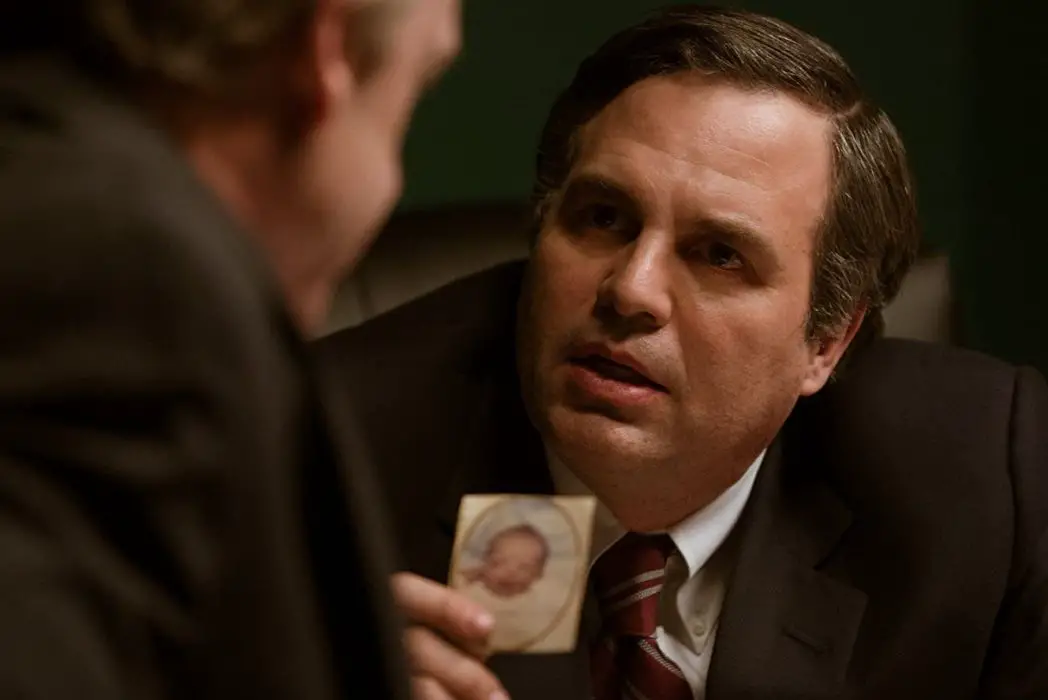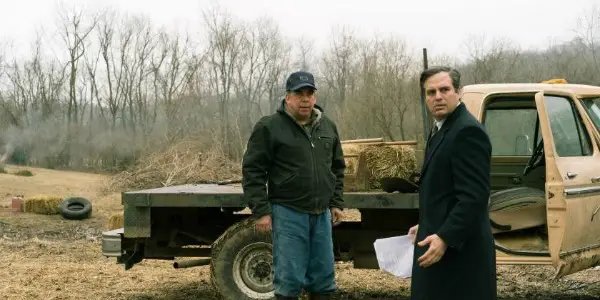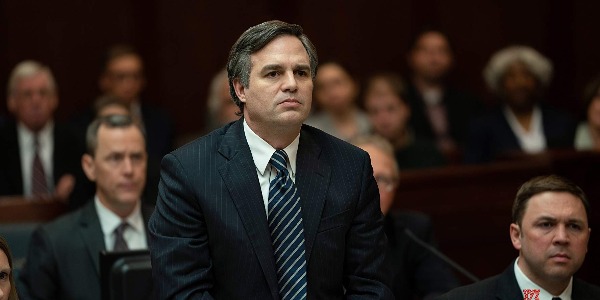DARK WATERS: A Gritty Look At Corporate Greed & Deception

Holly is a final year film/journalism student currently living in…
Opening with an eerie depiction of 1970’s West Virginia that resembles a horror flick, Todd Haynes’ film Dark Waters paints a sombre picture of despicable corporate corruption, and the toll that advocating for justice takes on those in underprivileged communities. Based on the true story of the Teflon scandal that captivated the nation and exposed a company-wide conspiracy at the DuPont chemical company, Mark Ruffalo stars as environmental lawyer and Taft employee Rob Bilott, whose painstaking fight against DuPont lasted over a decade.
Haynes’ take on the procedural legal drama is almost apocalyptic, with a constant dark colour palette, desaturated tones, and sinister imagery that feels fresh and elevates it above others in the same genre. The extent of the collateral damage inflicted upon countless living beings is unimaginable and never shied away from, captured with an unrelenting sense of doom and despair.
After an unsettling prologue that foreshadows the despicable government negligence going on behind the scenes, the film flashes forward decades to the beginning of Bilott’s involvement and investigation of the case. Local Parkersburg farmer and family friend Wilbur Tennant (Bill Camp) is the catalyst, who brings his long-held concerns around the deaths of his cows to Bilott in person, alongside a stack of videotapes that end up serving as undeniable evidence that something is afoot. Against the advice of Taft head Tom Terp (Tim Robbins), Bilott agrees to help the Tennant’s, despite Taft’s long-held professional relationship with various members of DuPont and surrounding bodies.
Deception runs deep
What follows is a decades-long pursuit of compensation, legitimisation, and responsibility that seems almost impossible at times. The repercussions of DuPont’s many intentional malpractices were far-reaching and unprecedented, eventually becoming an issue of global public health. Children were being born with unexplained physical deformities, and otherwise healthy adults were rapidly declining in health due to undefinable illnesses. The culprit? In some cases, their everyday drinking water.

It’s in a chilling scene of lost innocence where Bilott registers this discovery on one of his many drives through West Virginia, when he notices the blackened teeth of two blissfully unaware teenagers biking through the streets. The realisation and horror are expertly crafted by director Haynes, whose purposeful technical choices create a thoroughly tense atmosphere reminiscent of a slasher film. Director of photography Edward Lachman does an exceptional job of highlighting the dark nature of the narrative through his depiction of desolate landscapes and bleak city life, again leaning into the almost apocalyptic style that Haynes builds.
Bilott’s fight for answers and restitution — as he attempts to navigate around government bodies and institutions — eventually leads to significant financial, physical, and emotional strain. The casting of Mark Ruffalo is superb, who brings an essential amount of empathy to this mild-mannered, well-meaning, often socially reclusive lawyer simply trying to do the right thing.

As discoveries are made and the extent of the fallout is unravelled, Bilott’s personal and emotional investment in the case becomes extensive, leading to several heartfelt scenes that showcase Ruffalo’s immense experience as an actor. Robbins and Camp are formidable in their respective roles; thoroughly engaging in their back and forth sparing with Ruffalo and adding emotional weight to the story through their performances. Whenever either is on screen, you sit up straight and listen.
As the time frame continues we get a glimpse into Bilott’s deteriorating home life, and the scepticism his family has faced as a result of him taking on the Tennant case. Unfortunately this part of the narrative is tedious and by the numbers, with the characterisation of Bilott’s wife (Anne Hathaway) being a huge misstep amongst otherwise well-developed characters. She is the cliche spouse character that many film-makers have failed to flesh out or deal with appropriately: nagging, emotional, and unwaveringly loyal.
Oscar-winning actress Hathaway makes the most of the material she is given, though ultimately the familial, domestic sequences are undoubtedly the least compelling of the film’s run-time. While it appears as though this was an intentional choice from Haynes, who clearly wanted to accurately reflect the social constructs and stereotypes of the time (men being the providers, women being the homemakers), this valuable screen time could’ve instead been given to more clever sequences of investigative storytelling.
Dark Waters: Conclusion
Underneath it all, both subliminally and outright, Haynes is contrasting. Those with unlimited power and resources are painted against the everyday members of society just trying to get by. The repercussions of greediness and willful ignorance reach further and hurt deeper than anyone can imagine, and in this case went beyond Wilbur Tennant and his ill-fated cows.
What’s significant here is Haynes’ unwavering commitment to honesty and truth, and his refreshing take on the biographical genre that feels not only worth watching but worth exploring further. Dark Waters is poignant, infuriating, and anxiety-inducing in the best possible way, and serves as a reminder of the importance of compassion and responsibility — now more than ever.
Does content like this matter to you?
Become a Member and support film journalism. Unlock access to all of Film Inquiry`s great articles. Join a community of like-minded readers who are passionate about cinema - get access to our private members Network, give back to independent filmmakers, and more.
Holly is a final year film/journalism student currently living in Queensland, Australia. She is an all-around movie enthusiast, though currently her favourite directors include Wes Anderson, Martin McDonagh, and Alfonso Cuarón.













